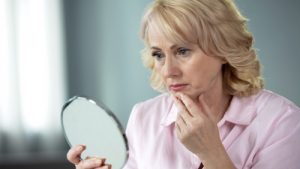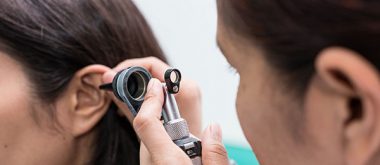The onset of menopausal hormone fluctuations can have a dramatic effect on a woman’s skin. However, there are a number of ways to slow the outward signs of the natural aging process.
During menopause, natural estrogen levels may drop, causing a plethora of physical manifestations, including skin sensitivities and rapid signs of aging. Some common skin issues resulting from menopausal hormone fluctuations are easily addressed, while others may require professional attention.
Dry, Itchy Skin
Dry, itchy skin may affect any part of the body both during and after menopause. Localized areas of dryness can result in skin redness, rashes and flaking.
For the most part, the solution is as easy as finding the right moisturizer for your skin type. Also, increasing omega fats in your diet can help ease symptoms. If symptoms become more severe, see your doctor in order to evaluate for possible skin conditions.
Hormonal Acne
A hormonal imbalance could also result in facial skin becoming oily instead of dry. Often, a specific skin-care regimen including products with ingredients such as retinol, derived from vitamin A, can help clear up the oily-skin problem.
Again, a healthy diet is important to maintaining healthy skin and preventing potential skin issues associated with aging. Avoid fast food, sugary soda and fried foods that can cause skin eruptions at any age.
 Increased Sagging, Wrinkling
Increased Sagging, Wrinkling
Decreased estrogen levels can lead to lessened elasticity in the skin, and the redistribution of fat cells causes some areas of skin to lose their support and sag. Also, unhealthy conditions such as smoking, obesity or excessive alcohol use may exacerbate the problem.
There is no way to escape the effects of aging, but a proactive skin regime, mindful diet and regular exercise can help slow the progression of wrinkling, sagging skin.
Age Spots
Dark spots, or melasma, are not uncommon during menopausal hormone fluctuations. The spots may be encouraged by genetics or habitual overexposure to the sun.
There are manynatural and OTC remedies touted to be effective for reducing the appearance of dark spots. However, it’s a good idea to educate yourself on the difference between an age spot and skin cancer. If you’re not sure, see your doctor for an evaluation.
Thinner Skin
Menopause may also trigger a decrease in the production of collagen, which is needed to maintain proper skin thickness and suppleness. Thinning skin, or dermatosis, can make bruising easier and skin injuries more frequent and harder to heal.
Vitamin A is essential to healthy skin, so adding foods rich in this vitamin can help skin stay healthy. There are also many moisturizing skincare products that contain the needed topical nutrients. Your doctor may also be able to suggest the most effective products and protections for thinning skin issues.
Contributing Factors
While menopausal hormone fluctuations are often a major impetus for skin issues in older women, there are other contributing factors to consider. Many of these factors can be alleviated by simple lifestyle changes. Here are a few:
- Genetics
- Diet
- Stress
- Sleep routine
- Lack of exercise
Establishing a healthy lifestyle before the onset of menopause would be ideal, but if you find yourself somewhat behind the curve, take heart. It’s never too late to start making simple changes to improve your overall health and lessen the impact of aging on your skin.
Treating Menopausal Hormone Fluctuations
When it comes to your skin, there are many recommended treatments for the above issues and more. A dermatologist will be able to help you better understand what to expect and how to face the future of your skin proactively.
Hormone therapy may be an option in extreme cases. However, there is a great deal of controversy over the efficacy and possible side effects of this therapy, so learn what you’re getting into before starting it. Staying healthy is the most important goal, along with recognizing your own beauty at any age.

 Increased Sagging, Wrinkling
Increased Sagging, Wrinkling



